- Home
- Steven Ehrman
The Viking General (A Sherlock Holmes Uncovered Tale Book 9) Page 2
The Viking General (A Sherlock Holmes Uncovered Tale Book 9) Read online
Page 2
“Richard, how could you allow such a thing to happen?” he nearly shouted.
Richard Compton rose to his feet and took several steps towards the intruder. I thought for a moment that they were going to come to blows. Suddenly, I saw the anger ebb from the bald man’s face, to be replaced by sorrow.
“I apologize, Richard,” he said. “I know this cannot possibly be your fault. You loved Jonah, as I did.”
The two men embraced, and the stranger walked to the side of Jonah Compton and knelt by the body. After a moment of silent prayer he arose.
“Dr. Watson,” began Richard Compton, “allow me to introduce Burton Winfield.”
I strode forward and extended my hand to the man. We shook, and the strength of the man nearly brought me to my knees. It was certain that Burton Winfield was a dangerous man to fall afoul of.
“Where is the Judge?” asked Richard.
“He had to wait for his carriage to be made ready,” came the reply. “His gout, you know. I dashed here on foot to find out what had happened. I was worried about Sara, but she seems to be holding up well.”
“She is a strong woman,” said Richard.
Richard Compton brought Winfield up on all that we knew at present. Winfield asked no questions, but was absorbing the information intently. Finally, the man turned his attention to me.
“Doctor, you alone in this house are a stranger to me,” said Winfield. “What is your purpose here?”
The fact that I was not an intimate of the house seemed to arouse suspicion in the man. I explained that I had been treating William Compton for the past week.
“Of course,” he said. “I remember now that Sara had mentioned that. So you just happened to be here when this tragedy occurred?”
“Yes. In fact, I was in the boy’s room with his mother when we heard the shots and then Mrs. Compton’s screams.”
“I see,” said Burton Winfield. “And where were you, Richard?”
“I was playing at billiards with Warren, if you must know,” said Richard Compton, in an annoyed tone. “What business is it of yours?”
“Richard, surely you can see that everyone must be asked their whereabouts at the time of the crime. Thomas, where were you?”
“I was taking a walk,” he said mechanically. The man appeared to be in a trance. It was, undoubtedly, the shock settling in on him, I thought.
“Leave him alone, Burton,” said Richard Compton. “Let the police handle this. You cannot just run roughshod over people. Oh, here is the Judge.”
I turned, and saw a portly, white-haired gentlemen limp into the room, leaning heavily on a thick cane. He shook hands with Richard Compton before settling into a seat next to Thomas.
“Should we not at least cover him, gentlemen?” wheezed the man, pointing at the corpse. “I cannot bear to see him like this.”
“We should not disarrange the scene until the police arrive,” said I. “We might accidentally destroy a clue.”
“What clue?” asked the Judge. “It seems very straightforward to me. Who is this man anyway?”
Richard Compton, again, made introductions. When I mentioned that I had been at many crime scenes in the company of Sherlock Holmes, I saw new respect shine in the eyes of the three older men. Thomas Compton made no attempt to join the conversation and sat lifelessly on the sofa.
“Where the devil is Inspector Cavendish?” asked the Judge. “The man may be a witless fool, but he could at least be here to conduct an investigation.”
“Cavendish is no man’s fool,” said Richard Compton. “He may not be flashy, but still waters run deep.”
“So do mineshafts,” muttered the white-haired jurist.
I strolled back to the desk and sat down. I tried to picture the scene. I could see Jonah Compton seated at his desk, discussing something with a guest. He packs his pipe, and then does not light it, because a violent argument breaks out. A gun is fired multiple times, and the struggle ends with the General being stabbed in the stomach. The killer escapes through the window before the door is broken down, but where does the killer go? There are dark woods surrounding the estate. It was then a chilling thought came to me. What if the killer exited by the window and then simply walked back inside the house through an open door? It could be done quite easily. It would be a dangerous and audacious murder, but a man with a cool hand could do it. My head simply swam with the possibilities.
“I wish Holmes were here,” I said aloud.
“Your wish is granted, Watson,” said a well-known voice emanating from the doorway.
I looked up, and saw the familiar spare figure of my old friend standing at the entrance to the study.
Chapter Three
My surprise lasted only a moment, and I then fairly leapt to my feet and rushed across the room to welcome Holmes. Inspector Cavendish was hard on Holmes’s heels. Both came into the study. I spied two police sergeants stationed just outside the room in the hall. Introductions were made all around. Holmes went immediately to the body and made a thorough examination of the corpse. Cavendish stood beside him, and made copious notes. Holmes finished his examination, and turned to me.
“Watson, knowing your nature, I assume you rushed to the body upon entering.”
“That is so. The General must have only been dead for minutes.”
I quickly brought Holmes up-to-date on all that had happened.
“You say you heard six shots in total.”
“Yes, Holmes. One, then a pause, and five more quickly.”
“And you, Mr. Compton,” said Holmes to the dead man’s brother. “I understand you and Mr. Warren Compton were playing billiards during this time. Do you agree with Dr. Watson’s testimony?”
“That is precisely how it happened,” said the man.
“From my understanding,” began Holmes, “your position in the billiards room is somewhat closer than the Doctor’s position in the sickroom of William Compton. I am surprised that Dr. Watson was first to the lady’s aid.”
“This is an old home of ancient construction, Mr. Holmes,” said Richard Compton. “We heard the shots, of course, but Warren thought they came from the woods. When Sara began screaming, it was very faint, the door to the billiards room being closed. In fact, I did not hear it. Warren was the one who said he thought someone was crying for help. Only then, did we rush to her aid.”
“The door to young William’s bedroom was open, Holmes,” I said. “I was standing near the doorway when these events occurred.”
“I am certain that explains the discrepancy,” he said. “However, there is another thing that is still not explained. Everyone agrees that six shots were fired, but I find no bullet wounds on the body.”
“What are you saying?” asked Richard Compton.
“I should think that my meaning is quite clear,” replied Holmes. He looked to me with a frown. “Doctor, I fear your examination of the body was one of a most cursory nature.”
I was a bit taken aback at the news that Holmes had given all of us.
“I cannot believe that I missed that point, Holmes. You must understand that it all happened very quickly, and I was attempting to discover if the man was beyond hope. I’m a doctor, not a coroner.”
“Of course not, Watson,” said Holmes, as he clapped a hand on my shoulder. “Perhaps I have put it too harshly, but the fact remains that shots were heard, yet the man was not killed by such. I believe that one of the bullets is directly above us.”
Holmes was pointing at the ceiling, and I saw immediately what he meant. There was a small hole that looked quite recent. A chair was pulled over and Holmes climbed upon it. He produced a folding knife from a pocket and went to work. In a matter of minutes, he had removed the bullet from its hiding place. Upon stepping down from the chair, he handed the evidence to Inspector Cavendish.
Cavendish was a large, stout man with a bald head and a great walrus mustache. He turned the bullet over in his hand and then put it his pocket. We began to make an examinatio
n of the other walls and the floor until we found the missing five bullets. Holmes again was first to the spot. At a cry from him, I saw five bullet holes in the wall opposite the door approximately five feet high in a tight grouping.
“That explains where the other shots went,” said the Inspector, “but it doesn’t tell us much more than that.”
“You think not, Cavendish?” asked Holmes. “Perhaps you are right, but we shall see.”
Holmes next made a thorough examination of the entire room. He began at the desk of the General. He returned to the body and went through the man’s pockets. I attempted to ask a question, but Holmes waved me off.
The others in the room were following Holmes’s progress with varying degrees of interest. Thomas still appeared to be in a state of shock. Richard Compton and Burton Winfield had retreated to a corner of the room and were having a quiet conversation. I could not hear the words being exchanged. The Judge was watching my friend intently, as if trying to read the mind of the great detective. Inspector Cavendish, meanwhile, was duplicating Holmes’s inspection, taking Holmes’s place as he vacated one area for the next.
After leaving the body, Holmes went next to the fireplace and then the door. I thought I saw a smile cross his lips, before he went to the open window. He went once around the entire room before he took a position at the desk and sat.
“And to think that I have been worried over copyrights,” I heard Thomas Compton mutter. “It seems a small matter now.”
I went to Holmes and asked in a low voice, “What of the Jewel of Namibia?”
“That case has been solved, Doctor,” replied Holmes. “I am afraid that the details must be kept confidential from the public for some time, but I will apprise you of the particulars, when we have time.”
“But perhaps the cases are connected,” I protested. “It just might be that whoever stole the jewel, also came here with designs upon some item of value and was caught red-handed by General Compton.”
“And what item would that be, Watson? I see nothing of great value in this room.”
“But remember, that the villain escaped. He might have carried away with him his prize.”
“I take it that you posit the culprit escaped through the window.”
“Of course, Holmes. Where else?”
“Where else indeed, Doctor,” said Holmes. “However, put the Jewel of Namibia from your mind. I assure you, it has nothing to do with this matter.”
“As you say, Holmes.”
I saw that the Inspector had joined Richard Compton and Burton Winfield. He was making notes as they talked. Holmes, meanwhile, took my former station at the fireplace mantel. After a few more minutes, Inspector Cavendish approached him.
“Well, Mr. Holmes, everyone’s stories seem to add up,” he said. “This was a mean little murder, but I wager that we will have caught our man by morning. He cannot have gotten far, and we will have the trains watched.”
“So you believe the killer to be prowling about the countryside, proclaiming his guilt by his furtive manner.”
“Have your little joke, Mr. Holmes. You know I admire your talent at deduction, but this seems an ordinary matter, if a bloody one.”
At the Inspector’s words, I stole a glance at the body again. It was little wonder that neither I, nor anyone else, save Holmes, had noticed the absence of a bullet wound. The knife laceration was terrible to look at. It appeared to me that the culprit had twisted the blade after the initial thrust into the body. The lifeblood of the man had poured out of him, in literally seconds. I shook my head and shuddered a bit.
“Please, tell me your theory of the crime then, Inspector,” I heard Holmes say.
The Inspector cleared his throat in a pompous manner.
“Well, it is really quite simple, Mr. Holmes,” he said. “Admit it. You do not like simple cases.”
Holmes merely smiled and made no reply. The Inspector went on.
“I would say that an intruder found his way into the study and was interrupted by General Compton, before he could make good an escape.”
“I see,” said Holmes. “The General finds this intruder in his study, and then locks the door and sits down to smoke a pipe with the man.”
“My father never smoked a pipe,” said Thomas Compton in a quiet voice.
“What’s that you say?” asked Cavendish.
“Father never smoked a pipe. He kept several pipes for guests and some shag tobacco, but he always smoked cigarettes.”
Holmes strode to the desk.
“And yet this pipe has been packed, as can plainly be seen,” observed Holmes, holding the pipe by the large bowl. “However, this ashtray full of cigarette stubs confirms the General was not a pipe man.”
“Well, that does change things a bit,” conceded Cavendish. “Why would the General smoke with this person?”
“I feel constrained to point out that the pipe is unlit, so the General did not actually share a smoke with anyone,” said Holmes.
“Lit, unlit, what is the difference?” asked the Inspector. “The point is that it does seem unlikely for General Compton to offer a pipe to a stranger robbing his home.”
“Do any of you gentlemen smoke a pipe?” asked Holmes to the room at large.
Burton Winfield frowned at the question and spoke before anyone else.
“I smoke a pipe, Mr. Holmes.”
The Judge stated that he was a cigar smoker, Richard Compton said he was a cigarette smoker, and Thomas Compton revealed that he abstained from tobacco use.
“Where were you when the murder occurred, Mr. Winfield?” asked Holmes.
I had thought that the question might set off the volatile man, but he surprised me with a rueful smile.
“What’s sauce for the goose, is sauce for the gander, I suppose,” he said to a puzzled Holmes. “I was telling everyone before you arrived that the authorities would likely ask that question. Very well, I was in my bedroom at the Judge’s home writing a letter at the time the crime must have occurred.”
“And where were you, Judge?” asked Holmes.
“I suppose, I must have been in my study,” said the retired jurist. “That is where I was when the message arrived with the awful news.”
“Then, you can confirm that Mr. Winfield was there, as well,” said Inspector Cavendish.
“Of course, he can. Tell them, Wesley,” demanded Burton Winfield.
The Judge was clearly both embarrassed and uncomfortable.
“The truth of the matter is, that I had fallen asleep in my chair,” he said finally. “I’m sorry, Burt. It’s just that the butler had to awaken me when the message came. If he mentioned that to the police after I gave you an alibi, it would look terrible for both of us.”
“But no one could suspect either of us. We were all best friends.”
I tried to imagine the stout Judge climbing through the window, after killing General Compton, and failed.
“Then you three were longtime acquaintances,” said Holmes.
“We were all chums at public school. After that we went our separate ways, of course. Jonah went off to fight for Queen and country, Wesley read law at Oxford, and I decided to make my pile in the City.”
I was shocked to learn that the Judge was the same age as the other two men. He appeared ten years older to me.
I see,” said Holmes. “I beg your pardon, Inspector. I interrupted your narrative. Please, continue.”
“Well, there is not more to add. The General struggled with the man, and the gun went off. I am informed the gun was General Compton’s own weapon. The killer then employed a knife, which he likely brought.”
“That is not so, Inspector,” said Richard Compton. “The knife is also Jonah’s. I recognized it at once. He brought it back from India with him. With all this madness, I did not think to mention it. I believe he kept it in his desk.”
“Very well then, the killer grabbed the knife from the General, who was trying to defend himself. Once he realized the hou
se was going to be aroused, he escaped out the window.”
“Why did he bolt the door?” asked Holmes.
“To keep the body from being discovered, of course.”
“But it did not keep the body from being discovered.”
“Well, then he did it to delay the body being discovered or the General himself may have locked it before he discovered the intruder in the room.”
Holmes was nodding furiously in agreement.
“That is it, Cavendish, you have hit upon it exactly I believe, but there is still a very large problem with the bolted door,” said Holmes.
My friend did not elaborate, and Cavendish seemed relieved that Holmes agreed with him on anything.
“Then you largely agree with my theory, Mr. Holmes,” said the Inspector.
“I am afraid not, Cavendish,” replied my friend. “I think if you look out the window, you will see what I mean.”
The Inspector gave me a quizzical look. I shrugged, but followed him to the window. When we looked out, I was surprised to see an enormous mastiff snarling silently at us, his teeth glistening in the moonlight. The beast was staked by a rope, just outside the window.
“No stranger exited the room by that window, gentlemen,” said Sherlock Holmes.
Chapter Four
The others, save the Judge, rushed to the window to see what Holmes was referring to. I heard Thomas Compton speaking from just behind me.
“My God, it’s Rex,” he said. “I had completely forgotten he was out there.”
Inspector Cavendish gave him a fierce glare.
“Do you mean to say that you are responsible for this animal being staked outside this window?” he asked. “Why would you do such a thing?”
“It was Father’s own idea,” replied Thomas. “We have two mastiffs. The other is a female, and she is in oestrus. Father did not want a litter at present, so he ordered me to move Rex. Father is fond of the animal, so I staked him to a tether outside of the study. I never dreamed, of course, that…”

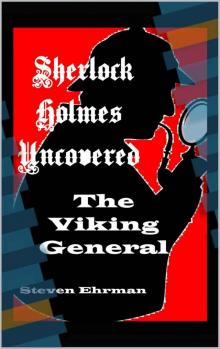 The Viking General (A Sherlock Holmes Uncovered Tale Book 9)
The Viking General (A Sherlock Holmes Uncovered Tale Book 9)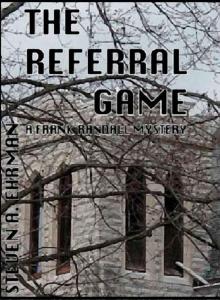 The Referral Game (A Frank Randall Mystery)
The Referral Game (A Frank Randall Mystery) Collection of Four Short Stories
Collection of Four Short Stories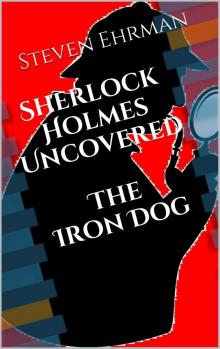 The Iron Dog (A Sherlock Holmes Uncovered Tale)
The Iron Dog (A Sherlock Holmes Uncovered Tale)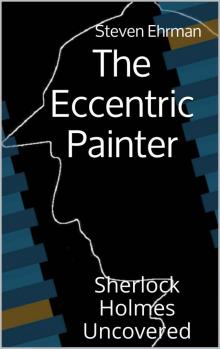 The Eccentric Painter (A Sherlock Holmes Uncovered Tale)
The Eccentric Painter (A Sherlock Holmes Uncovered Tale)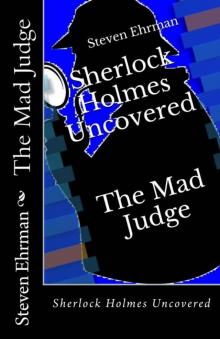 The Mad Judge (A Sherlock Holmes Uncovered Tale Book 3)
The Mad Judge (A Sherlock Holmes Uncovered Tale Book 3)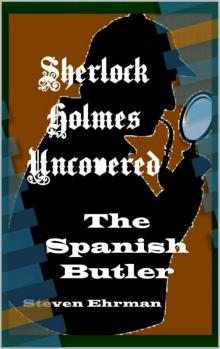 The Spanish Butler (A Sherlock Holmes Uncovered Tale Book 8)
The Spanish Butler (A Sherlock Holmes Uncovered Tale Book 8)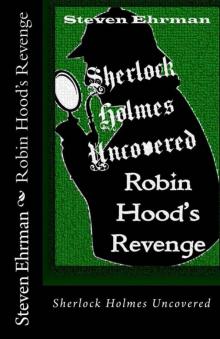 Robin Hood's Revenge (A Sherlock Holmes Uncovered Tale Book 7)
Robin Hood's Revenge (A Sherlock Holmes Uncovered Tale Book 7)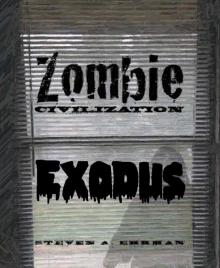 Zombie Civilization: Exodus (Zombie Civilization Saga Book 2)
Zombie Civilization: Exodus (Zombie Civilization Saga Book 2)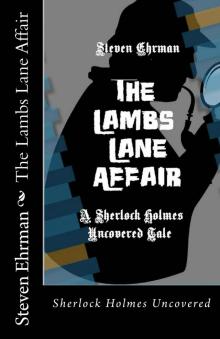 The Lambs Lane Affair (A Sherlock Holmes Uncovered Tale Book 5)
The Lambs Lane Affair (A Sherlock Holmes Uncovered Tale Book 5)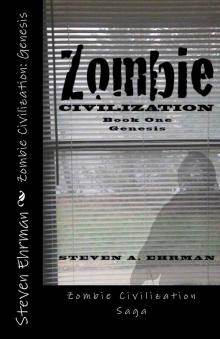 Zombie Civilization: Genesis (Zombie Civilization Saga)
Zombie Civilization: Genesis (Zombie Civilization Saga)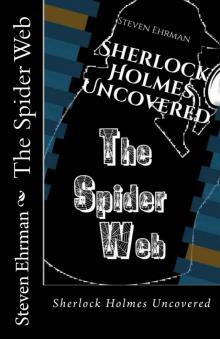 The Spider Web (A Sherlock Holmes Uncovered Tale Book 4)
The Spider Web (A Sherlock Holmes Uncovered Tale Book 4)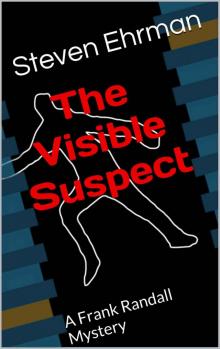 The Visible Suspect (A Frank Randall Mystery)
The Visible Suspect (A Frank Randall Mystery)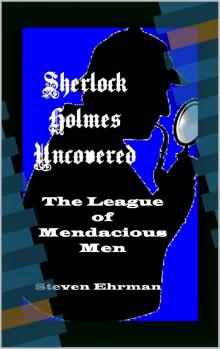 The League of Mendacious Men (A Sherlock Holmes Uncovered Tale Book 10)
The League of Mendacious Men (A Sherlock Holmes Uncovered Tale Book 10)